
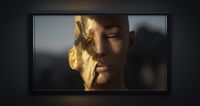
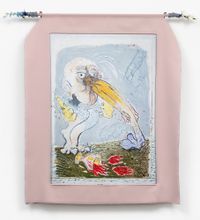
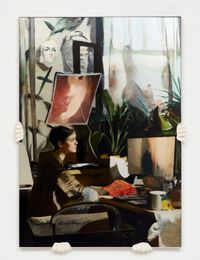
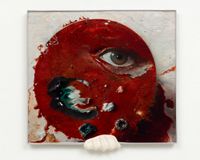
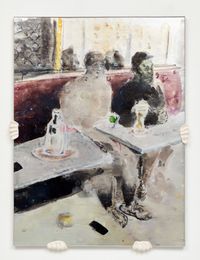
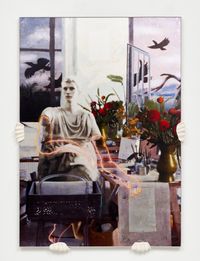
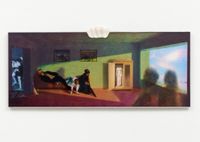
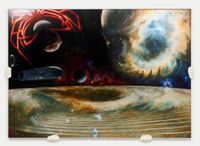
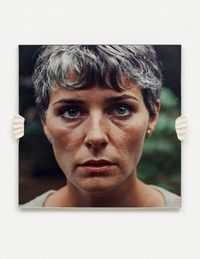
Sometimes it takes distance to be able to recognise something better. This also applies to the present, hence there have always been attempts in the genre of science fiction to consider it speculatively from the future. Hedda Roman follows a similar approach: for their exhibition Oldboy: Death to Dialectics, they have created a fictional universe inspired by Nabokov's 1962 novel Pale Fire and the 2017 neo-noir science fiction film Blade Runner 2049. Somnambulistically, they look back at a bygone Anthropocene from an imaginable future, oscillating between nostalgia and scepticism. It has passed, but is not yet completely forgotten: thus, in Hedda Roman's visual world, there are always elements that recall accomplishments and works of the human-centred age; it is full of art-historical references, yet on the one hand they appear contingent and on the other, as if they are simply dissolving and disappearing. Or is perhaps something completely new emerging here?
In the works of Hedda Roman, everything is in motion, contours dissolve, biosphere meets technosphere, there are no boundaries, everything belongs together, is fluid, rhizomatic. Everything is ambiguous and ambivalent. They are reminiscent of Donna Haraway's posthuman idea of a Chthulucene, characterised by practices of becoming- with, in which the human being is no longer exceptional, no longer absolute. In the Chthulucene, the conventional differences of time and place, nature and culture, biology and technology are dissolved, indifference and crowds reign. There is no individualism and no autopoiesis—nothing emerges from itself—but everything emerges from and with each other.
To be able to explore this posthuman world, Hedda Roman, in collaboration with an artificial intelligence whose underlying models they have trained with their own images and keywords, have created a humanoid artificial creature: placed at our side as a kind of android or replicant, she explores and grasps the unfamiliar on our behalf. They have named this creature "Oldboy", quite rightly: after the film of the same name by Park Chan-wook. Much like the original, Oldboy by Hedda Roman is also a traumatised anti- heroine. It is her poems, images, and memories with which she narrates to us a reality and present that, at first glance, seems surreal. With a second glance, they are the first attempts of language in the face of the striking intellectual challenges posed to us by discourses on climate, feminism or postcolonialism—to name just three major contemporary battlefields that shimmer in the texts. Oldboy is a metaphor for our individual and societal depression in the face of developments that seem increasingly inevitable, but also a metaphor for the fear of an unexpectedly occurring cataclysm causing the world we have long lived in to slowly die.
Oldboy: Death to Dialectics is a swan song to postmodern thinking, a ceremonious farewell to the idea that one can arrive at meanings or even truths through deconstruction. In a world where there are no opposites, no theses that challenge antitheses, one does not think dialectically. In Hedda Roman's fictional post- anthropocentric universe, thinking is different. We are challenged to imagine this other way to think, to look for new patterns of thought and ways of looking at things apart from the prevailing determinations and dichotomies. We are challenged to imagine this alternative way of thinking, to look for new patterns of thought and ways of looking at things beyond the prevailing determinations and dichotomies.
Annekathrin Kohout
Poststrasse 2+3
Düsseldorf, 40213
Germany
www.sieshoeke.com
+49 211 301 4360
Monday–Friday: 10am–6.30pm
Saturday: 12pm–2.30pm